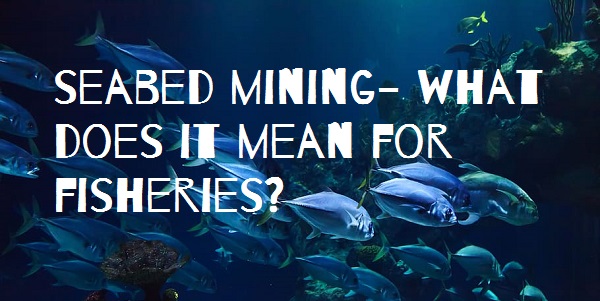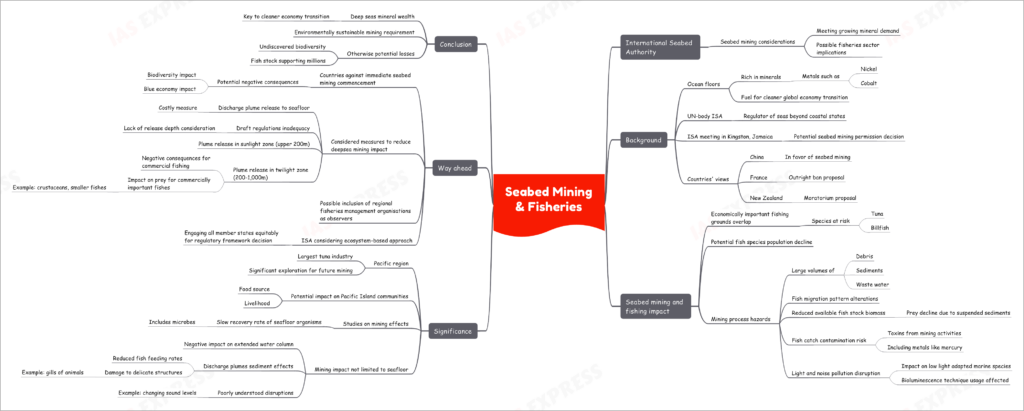Seabed Mining- What Does it Mean for the Fisheries Sector?

From Current Affairs Notes for UPSC » Editorials & In-depths » This topic
IAS EXPRESS Vs UPSC Prelims 2024: 85+ questions reflected
As the International Seabed Authority considers allowing seabed mining to meet the growing demand for minerals, concerns are being raised about its possible implications for the fisheries sector.

Background:
- The ocean floors are potentially rich in minerals bearing metals like nickel and cobalt. These metals are expected to play a key role in fuelling the global economy’s transition to a cleaner future.
- When it comes to exploring the seas beyond the jurisdiction of coastal states, the UN-body ISA (International Seabed Authority) is the regulator.
- In the coming days, at the meeting in Kingston, Jamaica, the ISA is expected to consider whether or not to permit the extraction of these valuable minerals from the seabeds.
- Some countries, like China, are in favour of seabed mining, while others like France are calling for an outright ban. Yet others, like New Zealand, are calling for a moratorium.
How can seabed mining impact fishing?
- Many of the seabeds being explored for mining are also some of the most economically important fishing grounds, especially for species like tuna and billfish.
- When ocean mining starts, the population of these important fish species would decline.
- During the mining process, massive volumes of debris, sediments and waste water would be dumped into these fishes’ environment.
- The disturbance would cause fish schools to alter their migration patterns.
- What fish stock is available would also have reduced biomass. This is because of a decline in their prey due to suspended sediments.
- The fish catch could be contaminated with toxins from the mining activities, including metals like mercury.
- The light and noise pollution will disrupt the marine species that are adapted to low light conditions and use techniques like bioluminescence.
Why is this significant?
- The Pacific, the region seeing significant exploration for possible mining in the future, is home to the world’s largest tuna industry.
- When the fish stock is affected, there would be a devastating impact on the Pacific Island communities’ food source and livelihood.
- Various studies have shown that mining can slow down the recovery rate of seafloor organisms’ population, including that of microbes.
- The adverse impact of seabed mining isn’t confined to the seafloor alone. The extended water column will also be negatively impacted.
- The sediments from the discharge plumes can have negative effects like:
- Reduces feeding rates among the fishes.
- Harms delicate structures like gills of the animals, etc.
- The impact of disruptions, such as changing sound levels, are still poorly understood.
What is the way ahead?
- Increasing number of countries are against an immediate commencement of seabed mining. This is because they stand to face significant negative consequences, not only to their biodiversity, but also their blue economy.
- Currently, some measures are being considered to reduce the impact of deepsea mining. For instance, the impact of discharge plumes can be reduced by releasing it to the seafloor. However, this is a costly measure.
- Beyond the cost constraints, the draft regulations fail to take the release depth of these plumes into consideration. If this measure is to be implemented, it is important to confine the release to beneath the sunlight zone (upper 200 m of the seas where the photosynthesis takes place).
- Also, it must be remembered that release of discharge plumes in the twilight zone (200-1,000 m below sea level) still has adverse consequences for commercial fishing. Vertical migrators like crustaceans and smaller fishes are important prey for commercially important fishes.
- Apart from these measures, the international regulatory mechanism can consider including regional fisheries management organisations as observers.
- The ISA is considering an ecosystem-based approach. It is vital to engage all member states on an equitable basis, before deciding on a regulatory framework.
Conclusion:
The deep seas hold a vast wealth of minerals that are key to driving our transition to a cleaner economy. However, if we do decide to tap into this wealth, it must be on an environmentally sustainable basis. Otherwise, along with the rich and yet undiscovered biodiversity, we would also be losing our fish stock that feeds and supports millions.
Practice Question for Mains:
Discuss the implications of starting seabed mining on the fisheries sector. What can be done about this issue? (250 words)
If you like this post, please share your feedback in the comments section below so that we will upload more posts like this.

